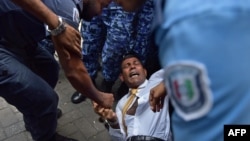The jailing of former Maldives president Mohamed Nasheed for 13 years last week followed a trial marked by "flagrant irregularities," the U.N. high commissioner for human rights said on Wednesday.
Nasheed, ousted in 2012 in what his supporters say was a coup, was found guilty of terrorism for ordering the arrest earlier that year of a judge, in a case that raised fears of further political instability in the Indian Ocean state.
In a statement, High Commissioner Zeid Ra'ad Al Hussein said the sentence handed down by the criminal court in Male, the Maldivian capital last Friday, was part of "a rushed process" that prevented Nasheed's defense from calling witnesses.
The trial "appears to contravene the Maldives' own laws and practices and international fair trial standards in a number of respects," said Zaid, a former Jordanian ambassador to the United Nations in New York.
India and the United States have also voiced concern over the case, but they were brushed aside by the government of the Indian Ocean archipelago, a major destination for affluent tourists off the southern tip of India.
"The trial was conducted in accordance with the relevant laws and criminal procedures prevailing in the Maldives. Due process was followed," Foreign Minister Dhunya Maumoon said on Monday.
When Nasheed, the country's first democratically-elected leader, was arrested last month, thousands of supporters of his Maldivian Democratic Party (MDP) and other groups from across the nation of 1,190 islands protested in Male.
Nasheed won the presidency in 2008 in elections that ended the 30-year rule of authoritarian leader Maumoon Abdul Gayoom.
Current president Abdulla Yameen, elected in 2013 in a contested vote, is Gayoom's half brother.





